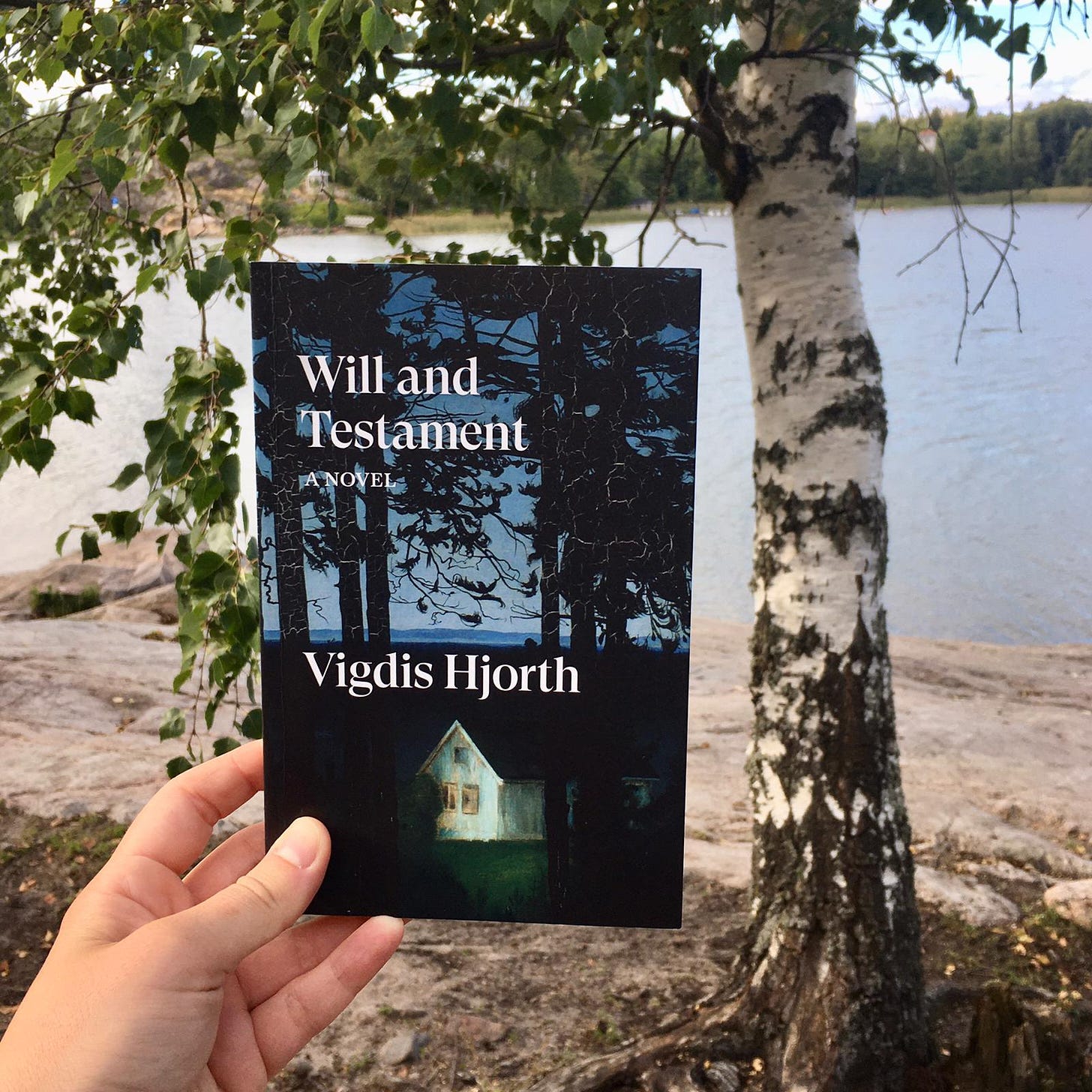Welcome to Bookmarked, a weekly newsletter following my journey as I read one book from every country. If you’re enjoying my project, I’d love it if you shared Bookmarked with a friend.
I love reality television. I’ve yet to miss a single episode of TOWIE, one of my favourite things about moving to Finland has been access to Temptation Island, and I sometimes (read: often) watch YouTube complications of my favourite Big Brother couples’ best moments.
It’ll come as no surprise, then, that as soon as I read a New Yorker profile describing Norwegian author Vigdis Hjorth’s Will and Testament as “reality literature,” I knew I had to read it.
It’s no secret that Will and Testament caused a major scandal upon its publication in Norway. Almost immediately after it hit bookshelves, the Norwegian media reported that Will and Testament contains verbatim extracts of Hjorth’s private family documents. Hjorth’s mother tried to sue a theatre company who were planning a staged version of the novel. And, most intriguing of all, her sister Helga Hjorth published a book in response to Will and Testament: the story of a woman whose sister wrote a dishonest autobiography and called it fiction.
But though I knew all of this before I started reading Will and Testament, I’m not sure anything could have prepared me for what I was about to read.
Autofiction or not—a debate which has unfairly consumed the narrative around Hjorth’s novel—Will and Testament tells an incredibly affecting story of a family divided beyond repair. Its main character Bergljot is a fiftysomething Oslo-based theatre critic who, like her brother Bård, is estranged from her parents. When their father announces his intention to leave two summer cottages to Bergljot’s sisters Astrid and Åsa, Bård persuades Bergljot that they need to break their years of silence to speak up against what he considers an injustice.
And so begins a terse dispute about inheritance, which takes a disturbing turn when Bergljot’s father unexpectedly dies and the family meets to discuss his will. It is during this meeting that Bergljot reads a personal statement including allegations that she was sexually abused and raped by her father as a child. Though Bård immediately believes her, Bergljot’s mother calls her a liar and an attention-seeker. Meanwhile her sisters refuse to listen, with Astrid repeating the phrase “Now is not the time or place” a total of four times. What follows is a devastating account of Bergljot’s family’s borderline manic obsession with silencing her.
I put the book down, for the first time, once I got to the end of the scene in which Bergljot speaks up. Up until that point, I’d binged the entire novel in one sitting, which was easy to do. Hjorth’s writing is prosaic to the point of being stark and I was totally absorbed by her story, weighing up claims from both sides of the dispute as the narrative progressed. I mean to say, the book felt gossipy until suddenly it didn’t.
While Bergljot’s family brush her allegations under the carpet, virtue signalling and refusing to listen, she is forced to confront her abuse time and time again. Hjorth writes about the complexities of abuse masterfully, exposing the intricacies of the systems that turn her mother and sisters into her oppressors with extraordinary skill.
Will and Testament is a desperately tragic story about the multifaceted nature of silencing. It’s a painful and devastating read. In 330-pages, Hjorth tells a staggeringly potent story with sensitivity and great care. I already know it’s a book I’m going to return to as soon as I’ve had time to let it sink in.
Will and Testament by Vigdis Hjorth, translated by Charlotte Barslund (Verso, 2019 / Cappelen Damm AS, 2016)
More books from Norwegian authors
Here’s a list of other recommendations I received this week. If you’re into climate fiction, I can really recommend The History of Bees.
Seven Days in August by Brit Bildøen, tr. Becky L. Crook
Ankomst by Gøhril Gabrielsen, tr. Deborah Dawkin
Paradise Rot by Jenny Hval, tr. Marjam Idriss
Sickle by Ruth Lillegraven, tr. May-Brit Akerholt
Naïve. Super by Erlend Loe, tr. Tor Ketil Solberg
The History of Bees by Maja Lunde, tr. Diane Oatley
Unquiet by Linn Ullmann, tr. Thilo Reinhard
Love by Hanne Ørstavik, tr. Martin Aitken
Knots by Gunnhild Øyehaug, tr. Kari Dickson
What have you read recently?
If you’ve read a brilliant book in translation or want to pass on a recommendation, I’d love to hear about it! For this project, I’m focussing on contemporary fiction and short stories, with a preference for female authors—but I won’t be too dogmatic about it so do share recommendations that don’t quite fit the bill, too.
You can get in touch by replying to this email or leaving a comment. I’ll be featuring your recommendations in upcoming newsletters, and I’ll keep a growing list here.
Bookmarked is written by Tabatha Leggett. Thank you to Mette Børja from Norwegian Literature Abroad for her recommendations for this issue. If you’ve been forwarded this email and you enjoyed it, you can subscribe below.





I've read this book [in the English translation.] The build-up to the family meeting and the meeting itself are brilliantly written and completely devastating. Just like Tabatha, I had to stop reading, put the book down and it was several days before I could get back to it. Fiction that can do this to a reader - well, I don't know if there's a word for quite how good that is.